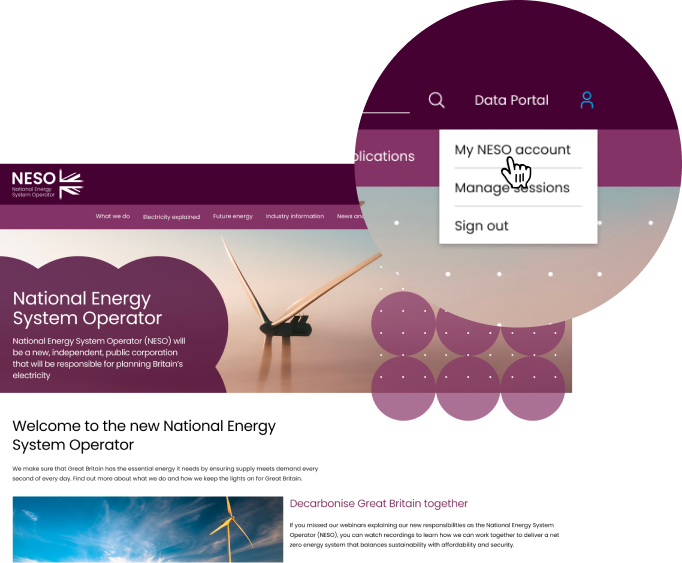Demand Flexibility Service explained
The Demand Flexibility Service (DFS) helps households and businesses participate in the electricity market by providing incentives, through suppliers and aggregators, for reducing or shifting demand.
In 2022, NESO, operating as the Electricity System Operator (ESO) launched a new Demand Flexibility Service (DFS) for the winter period, rewarding homes and businesses for shifting their electricity use during DFS events. Over 1.6 million households and businesses participated in the service, helping to balance the national electricity network at peak times.
DFS returned for winter 2023/24, and saw even more homes and businesses get involved, with 2.6 million participating.
Launching on 27 November 2024, DFS is back, enabling households and businesses to earn rewards from their registered DFS service provider in return for shifting their electricity usage during DFS events. This time, we’ll be offering opportunities to participate in the service across the year, rather than just in the winter months.

Why have we introduced the Demand Flexibility Service?
Creating more flexibility in our electricity system is vital for running a clean, green, and fair system of the future. DFS is a real breakthrough, and gives households and businesses a direct chance to participate in flexibility services. 2.6 million homes and businesses did so last winter.
The service could accelerate flexible energy use by many years, and will be watched with much interest by other countries.
If we can reduce electricity demand by rewarding participating customers to turn down when we need them to, it means we can avoid using expensive and polluting fossil fuel generators. This saves carbon, and also saves all consumers money.
If you are a household with a smart meter, or a business site with half-hourly metering, you’ll be able to sign up either your retail energy supplier or online providers/apps who are participating in the service. We have a list of registered DFS providers which we will update regularly from the start of the service.
If you have signed up to take part in the DFS with a registered DFS provider, they’ll contact you on the day we’d like you to shift your electricity use.
DFS events usually run for one hour, but can be for half an hour, or could run for a longer period. It’s a voluntary service and you do not have to participate if your registered DFS provider invites you to. In order to be eligible to receive an incentive from your provider you do however have to reduce your energy use during the DFS event times. When you sign up to take part in DFS you will need to authorise your provider to access your smart meter so they can read your data every half-hour for the duration of the service.
Participant electricity suppliers, aggregators are being added to a registered providers list, which will be updated regularly as new providers join DFS.
In support of consumer protection, the registered providers list also outlines which providers are aligned to the FlexAssure and HOMEflex codes of conduct which set out minimum standards for flexibility services such as DFS.
Households could reduce their power consumption during tests or live events by choosing to run power-hungry appliances such as washing machines, clothes dryers, dishwashers, electric showers and immersion heaters before or after the event. Another option would be to reduce energy usage (e.g. using a microwave instead of the oven) during the event window.
Efficient light bulbs and small appliances such as modern televisions consume very little electricity and so it is unlikely to be worth adapting usage of these during an DFS event.
Using electrical goods overnight can create increased risk of an incident, we advise all consumers to follow the guidance offered by organisations such as Electrical Safety First and where possible to avoid using their electrical appliances overnight.
Frequently Asked Questions
For households and businesses wishing to be rewarded for reducing electricity demands on the grid at certain times, you can do so via a registered provider.
Many retail energy suppliers are taking part in NESO’s Demand Flexibility service and will contact you if they are taking part this year. There are a number of online/app providers who can provide access to the service by linking directly to your smart meter data without contacting your energy provider as well. Please note households can only take part with one DFS registered provider at any time.
Note: Households need a smart meter to participate in this service, consent for marketing, and to access your half hourly electricity metering data.
This will depend on your individual circumstances, how much electricity you normally use and the rewards that your particular DFS registered provider is offering for taking part in the service.
We pay registered service providers, i.e. your supplier or aggregator, for the service, who in turn will choose how to pass those payments to you. This reward could be in pounds, points, or prizes.
If you opt in to provide the service, but for any circumstance, including for safety reasons, you are unable to reduce your electricity usage during a DFS event, there are no penalties. You will just pay for your usage as usual – there are no further implications for not taking part.
No, this service is about reducing your electricity use where you are able to – we are not asking people to go without electricity.
Efficient light bulbs and small appliances such as modern televisions consume very little electricity and so it is unlikely to be worth adapting usage of these during a DFS event.
Participating in the service is completely optional and customers do not have to take part in all events if they choose not to.
In order to verify delivery of demand reduction we need data in 30-minute increments.
This means that registered DFS providers are only able to sign up households and business who have smart meters capable of sending half-hourly readings.
We will continue to look at how to further expand the eligibility for services such as this in future so that we can increase participation in our services, as flexibility becomes a more automated and daily option to help consumers save on their energy bills.
Demand Flexibility Service
As part of a range of tools designed to help manage the electricity system this winter, we want to collaborate with energy suppliers/aggregators to reward participating households and businesses for helping support balance the grid this winter.
ESO’s Demand Flexibility Service approved for 2023/24 winter
Energy regulator Ofgem has granted approval to our Demand Flexibility Service (DFS) which will be available from 30 October 2023.


